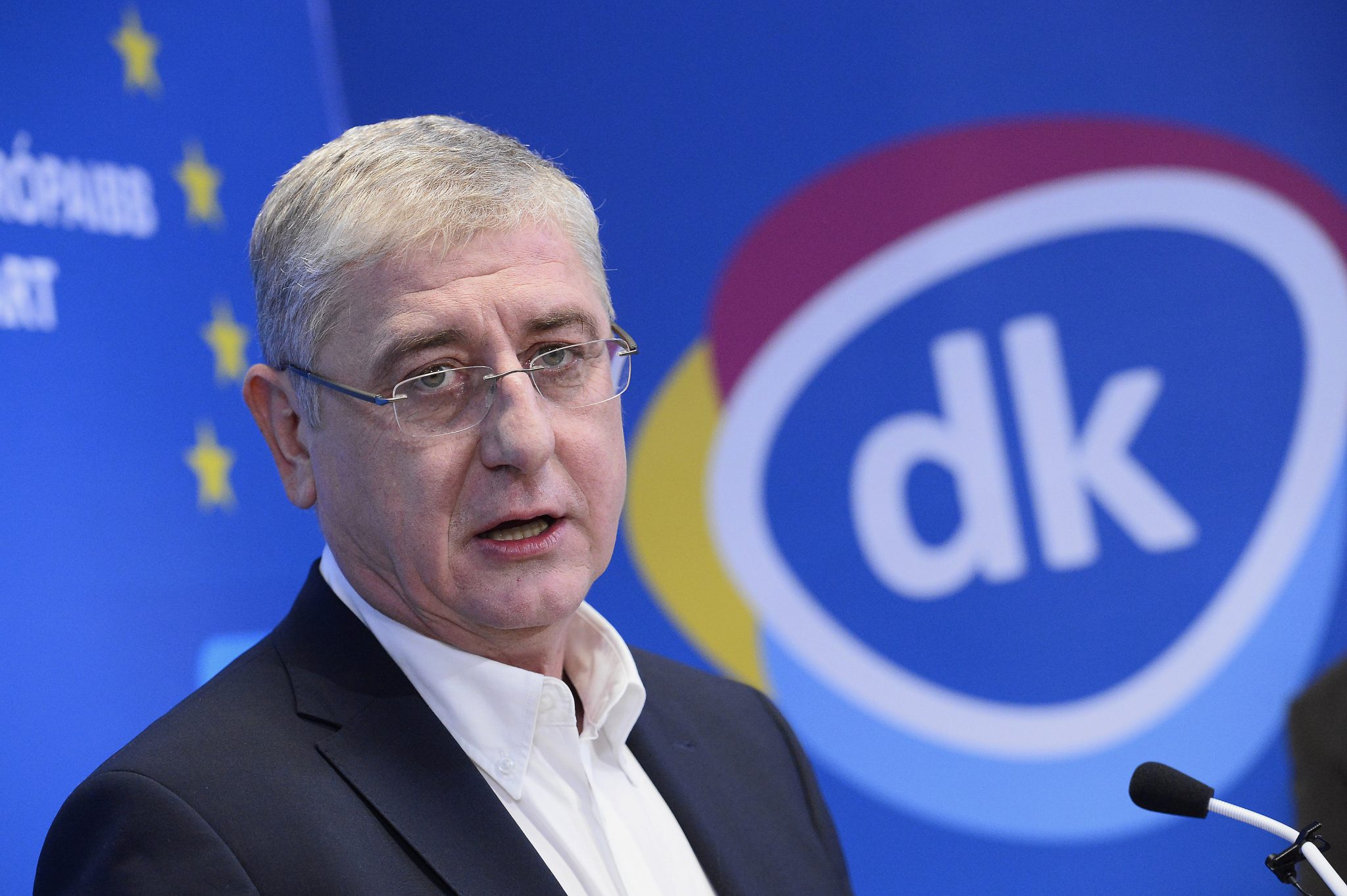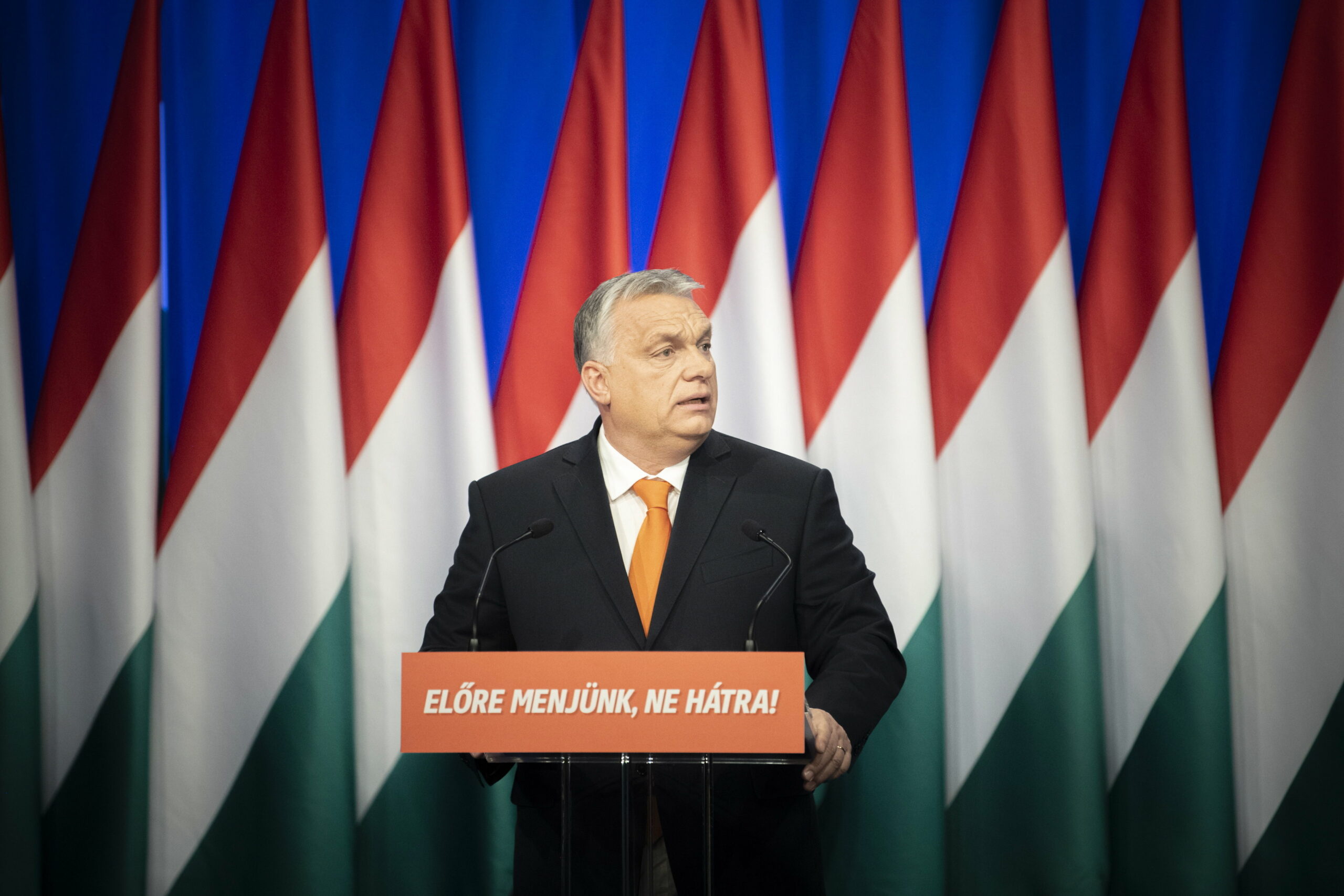
Ferenc Gyurcsány said the government was "tired" and "dissolute," lacking in fresh ideas and incapable of observing its own rules and principles.Continue reading

Prime Minister Viktor Orbán, in a keynote speech on Saturday kicking off the official election period in Hungary, castigated former prime ministers Ferenc Gyurcsány and Gordon Bajnai for heading a “talk show” and blaming them for “what’s happening on the left”. The Prime Minister told supporters that “we have one thing in common: we share a passion for Hungary.”
In his speech held at the Várkert Bazaar in Budapest, Orbán cited Gyurcsány as saying recently that both politicians were ready to return, and he accused Gyurcsány and Bajnai of “lumbering the whole country” with their “talk show”.
If Gyurcsány made a comeback, he said, “he’ll take us back to where we were before…”
Orbán said not only had the virus “attacked Hungary”, but so had the left wing in its hope of overthrowing the government.
He accused the left of demanding the lifting of lockdowns when it was appropriate to maintain them and of insisting on locking down when it was right to lift restrictions.
Orbán said the left cried “dictatorship”, conducted a campaign damning the government abroad, distributed fake videos, and spread horror stories.
He said exploiting the fear of millions of families in the hope of overthrowing the government during a deadly pandemic was “indefensible” and “grossly irresponsible”.
The prime minister said the left would have to face up to their actions on April 3.
The government, he said, had remained united and composed during the pandemic, and not for a single moment had the country’s capacities been endangered. In other words, the new constitutional order enacted in 2011, Orbán added, had stood the test.
The prime minister told supporters that “we have one thing in common: we share a passion for Hungary.”
He accused the left wing of adopting “a new political strategy” which involved “insulting people, making fun of people with disabilities, marching into the countryside and threatening pensioners and looking down on women”.
“People can’t believe their ears,” he said.
“De Gaulle may have been right: everyone can talk, but the leader also knows when to listen,” the prime minister said.
Orbán said the “greatest achievement” was that the Hungarian economy had withstood the crisis.
He noted tax relief for workers below the age of 25, tax refunds for families and the restoration of the 13-month pension.
“We are giving back what the Gyurcsány-Bajnai government took away.”
The prime minister also noted the 20 percent increase in the minimum wage this year and a 4 percent cut in taxes on labor.
Orbán referred to a “great national agreement” that brought the unions, employers, government and parliament under one roof. “Except, of course, the left, which didn’t vote for anything.”
Meanwhile, the prime minister announced the extension of the cap on prices for fuel at the pump by three months.
Orbán said that despite the pandemic, not since the change in 1990 political system had so many people had a job in Hungary, and now a million more people worked than during the Gyurcsány government.
He said Hungary’s exports had grown by a record 119 billion euros last year. In 2010, he noted, the government set out to draw key sectors under Hungarian control, reducing foreign ownership of banks, the media and energy companies to below 50 percent.
Orbán said that in spite of the crisis, Hungarian investment capital abroad had been “turbo-charged”. He noted the government decision to ensure that whatever profits are repatriated by foreign companies operating in Hungary should be matched by the repatriation of profits by Hungarian companies operating abroad.
“Only this way can Hungarian economy be kept in balance,” he said, noting new foreign investments by oil and gas company MOL and OTP Bank among others.
Meanwhile, the prime minister referred to the continuation of support schemes for Hungarian communities abroad, noting that the government has built 170 kindergartens in neighboring countries and renovated 790.
Orbán told supporters that during the crisis, too, Hungary had eschewed “the recipes of Brussels” in favor of its “own path”. Referring to central bank governor György Matolcsy and finance minister Mihály Varga, he said Hungary had adopted “the Matolcsy-Varga cure” for relaunching the economy. Rather than stepping on the brakes, economic policy overtook in a corner, he said.
Orbán said that notwithstanding the risks, the country’s economic growth had reached 7 percent amid the pandemic in 2021. The public debt, meanwhile, was kept below 80 percent of GDP and was on course to fall to 77 percent by year-end, he added.
The prime minister chided the left wing for not voting for legal measures to protect against Covid-19, adding that the opposition had also failed to vote for the credit moratorium, the increased minimum wage, the family tax rebate, tax relief for workers below the age of 25, and other tax cuts.
The Gyurcsány-Bajnai government, he added, had done the opposite to the current government in a crisis, abolishing the 13-month pension and home-building schemes, as well as the family tax credit, among others, while introducing a fee for visiting the GP and hospitals.
Meanwhile, surveying foreign policy, the prime minister noted that Hungary was “surrounded by unstable regions”, including the Western Balkans. Reassuring the Balkans was a simple matter, he said, arguing for the rapid EU accession of western Balkan countries and an “EU Marshall Plan”. Orbán added that it was “a shame” that none of this was happening.
Orbán said Hungary was now stronger and would not sit on the sidelines while “the great powers” enacted “bad policies” and “caused damage” to its neighboring region.
“Neither Berlin nor Brussels can go against the Hungarians when it comes to Balkan policy, and they can’t go without us either. We won’t accept decisions made in Brussels that are contrary to Hungary’s interests.”
Orbán said Hungary had an interest in “peace, economic development, and in the region becoming a part of the EU”.
On the subject of the Russia-Ukraine standoff, Orbán said that given Hungary’s size, as well as its military and economic strength, its influence on relations between the EU, the West and Russia was limited, but the government had made clear that it considered the EU’s strategy to be “flawed” and sanctions against Russia “a dead end”. Europe would remain “anemic” without economic cooperation with Russia, he said, adding that handing Chinese a huge economic advantage would be a “strategic mistake”.
Orbán said that in the face of the EU’s unyielding foreign policy, the government had developed a Hungarian model based on membership of NATO and the EU, while maintaining balanced political and economic relations with Russia.
“Hungary may lack a nuclear-powered icebreaker” he said, “but a pickaxe … can be enough to bring about common sense.”
Regarding Hungary’s security, he said “an area of adequate breadth” between Hungary and Russia was needed, and Ukraine’s independence and viability were therefore a vested Hungarian interest.
Orbán underlined Hungary’s support for developing Europe’s military capabilities and a common European defense force, and he noted related efforts under way to create a modern Hungarian army.
Orbán said poverty in Hungary was falling while the middle class were growing. Rural developments now receive three times what the previous government spent, he added.
He said a work-based economy generated money for spending. With more jobs and higher incomes, he added, taxes could be maintained at a low level, freeing up disposable income for people to consume and invest.
The prime minister said that but for global inflation, the economy would have performed even better. But the government had kept a lid on inflation by introducing caps on the price of fuel, household utilities, interest on loans and basic foods. Family benefits, he said, would be expanded.
On the subject of the pandemic, the prime minister said Hungary had been “the first to wake up” and take measures such as forming an operative body dedicated to handling the virus, purchasing ventilators, and readying hospitals in time. Hungary was also head of the queue for procuring vaccines and the “the first to reopen the country”.
Orbán said his government had settled the salaries of doctors, abolished gratuities paid by patients, and separated private from public health care under an agreement with the Hungarian Chamber of Doctors.
Thanks to developments in the health-care industry and the domestic production of masks, ventilators and medical aids, “we’re now producing what we … may need during another epidemic,” he said.
On the subject of migration, Orbán said every day hundreds of people were attempting to force their way into Hungary. Last year 122,000 made the attempt while more than 12,000 have done so in January this year alone, he said.
The border, he said, would only be protected “as long as the current government holds power”.
Referring to “pro-migrant bureaucrats in Brussels” and the “dangerous actors of the Gyurcsány show”, Orbán insisted that the borders would be opened by them and “our grandchildren will cry … that’s if there are any left.”
The prime minister said Brussels and Hungary had different views concerning Europe’s valuable traditions, the future of nations, and the family.
Noting the referendum on child protection to be held at the same time as the general election, he said: “The father is a man, the mother is a woman, and our children won’t be left unprotected.”
Orbán spoke of “deep differences between Brussels and Hungary”, saying this was explained by the fact that Western countries had not lived through a dictatorship. “We did not just have freedom; we fought for it.”
“The Cold War was won by the Poles, the Czechs, the Hungarians, the Germans, the Bulgarians, the Romanians, the Estonians, the Latvians and the Lithuanians,” he said, adding that anti-communism and the national idea “won the Cold War by restoring the nation state”.
“But they believe their liberal democracy overcame communism … George Soros is their hero,” he said.
Orbán said Hungary’s constitutional system guaranteed the rule of law, while “for them the rule of law is a tool to mold us in their own image”. “They’re not interested facts or arguments; they’re fighting a holy war, a jihad of the rule of law.”
Accusing the left-wing administration of Budapest of creating “chaos, dirt, homelessness and traffic jams, corruption, … arrogance and laziness”, Orbán said “everyone can see, they’re going backwards, not forwards”.
In the featured photo, Prime Minister Viktor Orbán giving his keynote speech at the Várkert Bazaar. Featured photo by Vivien Cher Benko/MTI/Prime Minister’s Press Office